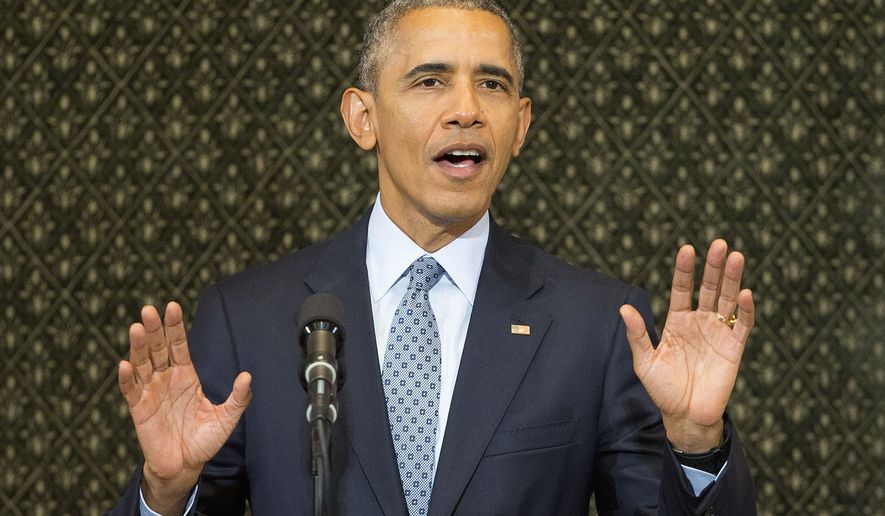In a plea for bipartisanship that provoked partisan reactions, President Obama returned to Illinois on Wednesday to celebrate the accomplishments of his presidency, even as his legacy is eroding before his very eyes.
“There’s no doubt America’s better off today than when I took office,” Mr. Obama told the state General Assembly in Springfield, where he once served. “We’ve gotten a heck of a lot done these past seven years despite the gridlock.”
But Mr. Obama acknowledged that he has failed to break the gridlock with Republicans in Washington, as he pledged to do when he announced his candidacy for president in Springfield on the same day in 2007. He accepted the criticism that “the tone in our politics since I’ve become president hasn’t gotten better; it’s gotten worse.”
Referring to bipartisanship, he told the legislators, “I was able to be part of that here, and yet couldn’t translate it the way I wanted to into our politics in Washington.”
House Speaker Paul D. Ryan, Wisconsin Republican, said Wednesday that high voter turnout in the Republican presidential primary proves that Americans are eager to put the Obama era behind them.
“The problem isn’t politics. The problem is the president’s ideas,” Mr. Ryan said. “The problem is the bitter polarization that comes from these ideas. Americans cannot wait to elect a new president.”
Even as he urged more cooperation between Republicans and Democrats, the president was subjected to some of the same partisan divisions that often play out during his State of the Union addresses to Congress. When Mr. Obama said America is “better off” under him, only the Democratic legislators stood and cheered.
When the president said that talking to Republicans “doesn’t make me a sellout to my party,” there was laughter in the chamber, and he had to pause for the commotion to subside.
Mr. Obama observed of his divided audience, “This is what happens. Everybody starts cherry-picking. One thing I’ve learned is, folks don’t change.”
The president’s visit to Springfield was meant to celebrate his presidency, even as his legacy unravels.
On Tuesday, the eve of Mr. Obama’s nostalgic trip, the Supreme Court dealt a stunning blow to his Clean Power Plan by ordering a stay of the Environmental Protection Agency’s regulation on carbon emissions. White House aides said they were surprised by the ruling and vowed to fight on in federal appeals court.
Results of the New Hampshire presidential primaries Tuesday night weren’t exactly promising either. In the Democratic primary, Sen. Bernard Sanders of Vermont trounced former Secretary of State Hillary Clinton, the candidate preferred by the White House to carry on Mr. Obama’s policies.
In the Republican primary, businessman Donald Trump won convincingly and vowed in his victory speech to get rid of Obamacare, the president’s signature achievement.
The White House tried to minimize Mrs. Clinton’s shocking loss by saying the energy of Democratic voters was more important than the winner and loser. The president didn’t mention Mr. Sanders on Wednesday but declared himself “a progressive Democrat. I make no bones about it.”
Asked about Mrs. Clinton’s broad lack of support among demographic groups in New Hampshire, White House deputy press secretary Eric Schultz told reporters, “That’s not how we see it.”
Mr. Schultz, traveling with the president aboard Air Force One, said Democrats showed “tremendous excitement” about the election.
“However this shakes out, candidates on the Democratic and on the Republican side … there’s going to be a massive contrast between those candidates,” Mr. Schultz said. “That’s going to boil down to, ‘Do we continue the progress we’ve made over the past seven years, or do we take steps backward?’”
In his speech, the president pleaded for Americans to fix the country’s politics, with changes in redistricting and reforms to the campaign contribution system.
“I speak to both sides on this,” Mr. Obama said. “All of you know it could be better. And all of you would feel prouder of the work you do if it was better.”
Mr. Obama made his speech a day after he delivered a federal budget to Congress that Republicans pronounced dead on arrival. In Illinois, the legislature and Gov. Bruce Rauner, a Republican, are mired in budget gridlock that has led to program cuts, with no resolution in sight.
Against that backdrop, Mr. Obama said, “Fixing our broken politics cannot wait.”
The president enumerated the problems that he believes are contributing to political dysfunction, including partisan redistricting, undisclosed political contributions, voter apathy and a “fractured” media. He said polarization means “if we can’t compromise, we can’t govern.”
“If I listened to some of these conservative pundits, I wouldn’t vote for me, either,” Mr. Obama said. “I sound like a scary guy.”
But the president didn’t offer any alternative legislation for Congress to consider, no doubt aware of the slim prospects with Republican leadership in a presidential election year. He joked, “I don’t have all the answers to this. If I did, I would have already done them through executive action.”
The president is reportedly considering executive action that would require federal contractors to disclose political contributions An official with the advocacy group Public Citizen commented, “Millions stand united in the request of the president to follow up on this rhetoric with action.”
Mr. Obama called for steps to make voting easier and chided legislators who did not applaud.
“This shouldn’t be controversial, guys,” he said. “I should get some applause on this, too.”
• Dave Boyer can be reached at dboyer@washingtontimes.com.




Please read our comment policy before commenting.